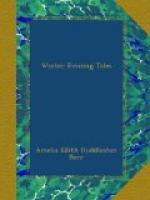For by simply going with the current in which in great measure, subject yet to early influences, he found himself, David Lockerby had drifted in one twelve months far enough away from the traditions and feelings of his home and native land. Not that he had broken loose into any flagrant sin, or in any manner cast a shadow on the perfect respectability of his name. The set in which Alexander Gordon and his nephew lived sanctioned nothing of the kind. They belonged to the best society, and were of those well-dressed, well-behaved people whom Canon Kingsley described as “the sitters in pews.”
In their very proper company David had gone to ball and party, to opera and theatre. On wet Sundays they sat together in St. George’s Church; on fine Sundays they had sailed quietly down the Thames, and eaten their dinner at Richmond. Now, sin is sin beyond all controversy, but there were none of David’s companions to whom these things were sins in the same degree as they were to David.
To none of them had the holy Sabbath ever been the day it had been to him; to none of them was it so richly freighted with memories of wonderful sermons and solemn sacraments that were foretastes of heaven. Coming with a party of gentlemanly fellows slowly rowing up the Thames and humming some passionate recitative from an opera, he alone could recall the charmful stillness of a Scotch Sabbath, the worshiping crowds, and the evening psalm ascending from so many thousand hearthstones:
O God of Bethel, by whose
hand
Thy people still
are led.
He alone, as the oars kept time to “aria” or “chorus,” heard above the witching melody the solemn minor of “St. Mary’s,” or the tearful tenderness of “Communion.”
To most of his companions opera and theatre had come as a matter of course, as a part of their daily life and education. David had been obliged to stifle conscience, to disobey his father’s counsels and his mother’s pleadings, before he could enjoy them. He had had, in fact, to cultivate a taste for the sin before the sin was pleasant to him; and he frankly told himself that night, in thinking it all over, that it was harder work getting to hell than to heaven.
But then in another year he would become a partner, marry Mary, and begin a new life. Suddenly it struck him with a new force that he had not heard from Mary for nearly three weeks. A fear seized him that while he had been dancing and making merry Mary had been ill and suffering. He was amazed at his own heartlessness, for surely nothing but sickness would have made Mary forget him.
The next morning as he went to the bank he posted a long letter to her, full of affection and contrition and rose-colored pictures of their future life. He had risen an hour earlier to write it, and he did not fail to notice what a healthy natural pleasure even this small effort of self-denial gave him. He determined that he would that very night write long letters to his mother and Janet, and even to his father. “There was a good deal he wanted to say to him about money matters, and his marriage, and fore-talk always saved after-talk, besides it would keep the influence of the old and better life around him to be in closer communion with it.”




